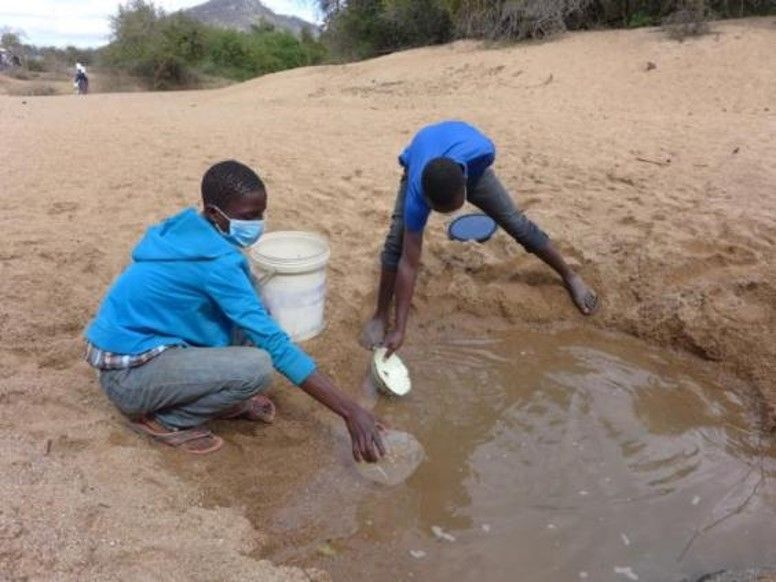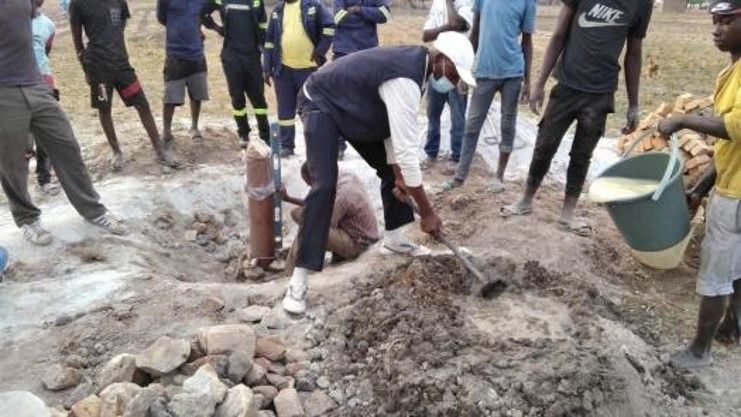
Water is the symbol of life. Have you ever experienced the hardship of having no access to water? In Zimbabwe in Southern Africa, Tzu Chi's most successful mission has become the digging of wells.
Zimbabwe is about 11,000 kilometers from Taiwan and covers an area of about 397,000 square kilometers, 11 times the size of Taiwan. It has a population of 15 million. It is a landlocked country that gained independence from Britain in 1980. Since 2000, the country has experienced a continuous decline, including economic collapse, hyperinflation, and severe water shortages caused by extreme climate conditions. They have led to a shortage of agricultural crops, with many social problems occurring as a result.
Tzu Chi volunteer Tino Zhu (朱金財) from Taiwan could not bear to see the suffering caused by the lack of water in Zimbabwe. Since 2013, he has been crossing valleys and mountains and going deep into rural villages to explore, dig, and repair wells continuously to help residents find and excavate clean water sources. When they have access to clean water, he then teaches them about farming and irrigation. This has changed the lives of people in this struggling country.
Hardship of Fetching Water
"Zimbabwe may receive rain between November and February, but it is also possible that it may not rain at all!" said Zhu, who has been doing business in Zimbabwe for 28 years. The country is very short of water; its people go through great hardships and use various means to fetch it.

Residents and livestock share polluted water pools on the roadside. The sanitary conditions of almost dried-up wells are very poor, and people use a pipe to connect to the neighboring village's well, or a deep borehole to extract water by forcefully sucking it up. But they cannot extract a large amount of water at once from the pipe and can only get about two buckets of water at a time. If someone takes the water ahead of them, they have to wait. Every drop is precious.
Ponds and polluted water pools are dirty and turbid; residents filter the water through two layers of cloth before use. Zhu asked: why not use a third layer of cloth for cleaner water? It is because the water is too dirty, and the water will not pass through if a third layer is used. Drinking water is hard to come by, and local residents have to use nearby ponds to bathe and wash clothes. However, the ponds are full of algae and garbage -- but they have no choice. These sources of unclean water often lead to infectious diseases such as cholera and typhoid fever.

In Zimbabwe, fetching water is traditionally the task of women. They have practiced and honed their skills since childhood; they can effortlessly carry a bucket of water on their head and one in each hand, totaling more than 20 kilograms. They can walk naturally without spilling a drop. They have to travel long distances of up to five to more than ten kilometers; the journey is full of dangers. Women's safety is not guaranteed; sometimes they have to bring their children to help fetch water, which affects their education.


Wells Bring Life Back
Since November 11, 2013, Tzu Chi has been digging wells for the suffering people of Zimbabwe. Over the past ten years, including new construction and repairs, 386 wells have been completed.
Zhu recalled the time when they repaired the first well. More than ten people spent 19 hours completing a huge project; but, later on, they gained experience and now it takes about five to six hours to complete. Although it is a difficult task, every time the volunteers repair or find a new well, they think of the importance of clean drinking water and the hopes and expectations of the people.
When they have a new well, they have high expectations. But repairing an old well is a different feeling -- they had it before but lost it when it broke down. Zhu remembered a 60-year-old grandmother whose well had been broken for 13 years. She had tried many ways to seek help from the local government and private organizations, but either they asked for a sum of money she could not afford amount or did not reply at all.
When Tzu Chi volunteers appeared, she thought it was a dream – but would it be possible? When the repair was completed and water flowed out, the grandmother touched the water repeatedly with her hands and asked excitedly: "Is this water? Is this water?" The local residents also responded joyfully, "Yes! It is water!" It felt like a dream come true.

During the 13 years of searching for water, two friends of the grandmother died from snake bites while fetching water. She sighed and said: "If this water had not been interrupted, these lives would not have been lost." On the day the well was repaired, the grandmother danced with joy, performing traditional Zimbabwean steps and thanking their Heavenly Father for guiding Tzu Chi to them and giving them a chance to be reborn.
Fearless
In Zimbabwe, ordinary residents used to help each other dig wells. But, since they were dug by hand, even with a lot of manpower, they could only be dug to a depth of about ten meters and the water obtained was relatively dirty. However, for Zimbabweans, it was already an impossible task. The surface water was not clean, and the amount of water was very limited -- not enough for drinking, let alone for planting or raising livestock.
Ten years ago Zhu saw that the cost of digging a well using manual labor, not including the cost of labor, was around US $200; he reported this to Master Cheng Yen, founder of Tzu Chi. Grateful for her compassion, Tzu Chi volunteers began to drill wells in the area, starting from a depth of 40 meters and now reaching a depth of 80 meters. Since Zimbabwe does not have industry, the underground water is clean. Although the cost of drilling a well is high, as long as the depth is enough, the residents can obtain water available 24 hours a day. At the same time, it reduces the many threats to the safety of women and children.

Zimbabwe has a vast land area and a large number of wild animals. In order to drill wells, volunteers have walked all over Zimbabwe and often encountered wild animals such as lions and elephants. They could only remind each other to be alert and careful. Although unpredictable accidents could happen, their hearts were full of hope to provide local water resources as soon as possible, so that people could have clean drinking water.
Zhu still vividly remembered the time when their car broke down while climbing a hill, and fourteen volunteers got out of the car to push it up. When they were walking down the hill, they chatted and walked at the same time. The local residents saw them and told them that they should not walk there because there were lions. They quickly became more vigilant and ran back to the car.
"At that time, we were really simple-minded, and all we were thinking about was how we could help them," said Zhu. When going to communities and rural areas, road conditions are usually very poor, and there is only one entrance and exit. Although the road is bumpy, Tzu Chi volunteers understand clearly that they need to help those at the end of the road; they need to move forward when it is difficult!

Unpredictable situations on the road often occur. When the car gets stuck on the road, residents will use oxen to help pull it. In Zimbabwe, when people see the Tzu Chi logo on a driver's uniform or on the car, they will say: "Tzu Chi's mom and dad are here!" It is a force of strength and stability.
Water is Life
In 2021, during a survey of local water scarcity, Tino Zhu accompanied a woman carrying her child on her back. The child's feet were swollen and only wrapped in gauze. After asking the mother, Zhu learned that the mother had to walk a long way to fetch water. On the way there, she carried the child on her back with an empty container. On the way back, she carried a water container on her head while holding her child's hand and another container in her other hand.
The path was narrow, and the child sometimes wandered into the grass, accidentally getting bitten by a snake. Fortunately, the snake was not the most venomous, but many people have died from snake bites because they did not receive treatment within seven hours.
This experience made Zhu feel that he needed to work harder. He urged the two well-digging teams to do their best and complete the task no matter how late it was. During the process of digging or repairing wells, unexpected obstacles sometimes arise. Even if the task was only completed at two o'clock in the morning, the volunteers would not stop halfway. The joy expressed by the villagers when the water flowed out was truly touching and incredible.

Zhu personally visited each well site to experience the villagers' happiness. When the water filled a container, he bent over and poured it on everyone, saying: "This is the Dharma water of the Master!" When he poured water on others, he would also pour some on himself, to symbolize the equality of all living beings. Zhu said: "When we see the water flowing out, we know that the lives of the villagers will change. With access to clean water, we can teach them how to plant."
Many people were born and raised in arid areas and lack knowledge of farming. With access to water, they can begin to change their way of life through planting. In Zimbabwe, maize is the staple food; it takes about three months to harvest. Volunteers take turns teaching and accompanying local people in the step-by-step process of planting. When the harvest arrives, they help them sell the crops at the market. The residents' intense feelings of joy, excitement, and gratitude are reflected on their faces, bringing happiness to the volunteers who gave their time and effort.
"This is a cycle of kindness!" Zhu, who has been deeply involved in Zimbabwe for a long time, is very grateful to have Tzu Chi and Master Cheng Yen's compassion; it allows him to grasp the present moment and save people from suffering. He also urges everyone to seize the moment when they see difficulties or people in need of help. He said: "When you take action, incredible opportunities will come your way."
A Jing Si Aphorism says: “Persevere even when it is hard to go on, release even when it is hard to let go, endure even when it is hard to bear -- this is how we build our character.”
Join Tzu Chi. Let us make the world a better place.
Story by Zhuang Yi-Qing, Zhu Ying-Yan, and Shen Yu-Lian from Zimbabwe 2023/03/30

